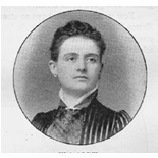Yda Hillis Addis
| Yda Hillis Addis | |
|---|---|

Yda Addis
|
|
| Born | 1857 |
| Occupation | Writer |
| Nationality |
|
| Spouse | Charles A. Storke |
Yda Hillis Addis, (born 1857, disappeared 1902) was the first American writer to translate ancient Mexican oral stories and histories into English. The most widely published of her more than 100 stories are The Romance of Ramon and Roger's Luck.
Addis was born in 1857 in Leavenworth, Kansas, and moved with her family to Chihuahua, Mexico, at the start of the American Civil War. The daughter of an itinerant photographer, Alfred Shea Addis, she roamed the Western frontier and Mexican wilderness, into Indian villages, miners' camps, and other exotic locations, mostly in California and Mexico, assisting her father. When she was 15, she and her family moved to Los Angeles where she graduated with the first class of Los Angeles High School; a graduating class of seven students. She also began teaching seven-year-olds.
Addis wrote many short stories, drawn from Mexican oral sources, as well as original fiction. Her writings included ghost tales, visitations of the unseen, tragic love triangles, and stories that presaged American feminism. In 1880 she submitted her stories of heroines, such as Poetic Justice and Señorita Santos, to The Argonaut, a bi-monthly San Francisco journal, founded by Frank M. Pixley. Soon her work was appearing in other publications such as The Californian, The Overland Monthly, Harper's Monthly, San Francisco Chronicle, Examiner, Los Angeles Herald, St. Louis Dispatch, Chicago Times, Philadelphia Press, McClure Syndicate and many Mexican newspapers and periodicals.
Pixley introduced her to his good friend and former California governor John G. Downey, in his late sixties. When Downey's sisters discovered that he and Addis had become engaged, they shanghaied him to Ireland leaving Addis to sue for breach of promise. Before the trial date, Addis left San Francisco for Mexico City to write for the bilingual newspaper Two Republics, owned by J. Magtella Clark. When the editor, Theodore Gesterfeld, became distracted with Addis' wit and charm, the editor's wife, Ursula, sued for divorce and named Addis a co-defendant. In Gesterfeld's testimony, he admitted to committing adultery, but not with Addis.
...
Wikipedia
